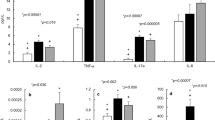Summary
Clinical trials using replication-deficient adenovirus as vectors for gene transfer into the airways of cystic fibrosis (CF) patients are in progress. However, little is known about the prevalence of wild-type adenovirus infections in patients with cystic fibrosis and their effect on lung function. To answer these questions, serum IgG and IgM antibody titers against adenovirus type 5 were prospectively measured by an indirect immunofluorescence assay in 199 CF outpatients and in a control group of 45 healthy children and young adults. In addition, we performed pulmonary function tests when the patients were in stable clinical condition. IgM antibodies against adenovirus were present in 104 of the 199 cystic fibrosis patients (52.3%). IgG antibodies against adenovirus were detected in 192 of the 199 cystic fibrosis patients (96.5%), and were significantly higher in cystic fibrosis patients older than 7 years than in younger patients and in age matched controls. IgG antibody titers measured a second time 11.8 months later in 143 of the 199 patients had increased in 48 (33.6%) patients. In 27 of these 48 patients, who had at least a 2-fold increase in antibody titer, FVC and FEV1 decreased by 9.8% (p<0.05) and 8.3% (p=0.05), respectively, over 45 months. In a comparison group matched for age, sex, and chronicPseudomonas aeruginosa infection but no increase in antibody titers, FVC and FEV 1 were unchanged. The results indicate that wild-type adenovirus infections are prevalent in cystic fibrosis patients and that wild-type adenovirus infections in cystic fibrosis patients seem to be associated with deterioration in lung function. These observations may have important implications for efficacy and safety considerations when using adenoviral vectors for gene therapy.
Zusammenfassung
Gentechnisch hergestellte rekombinante replikations-defiziente Adenoviren sind als Genvektoren für die somatische Gentherapie der pulmonalen Manifestation der zystischen Fibrose von Interesse. Der Einsatz rekombinanter Adenoviren für den Transfer von Genen in die Atemwege ist jedoch problematisch: Ein positiver Antikörper-Status gegen Adenoviren kann bereits bei der Erstapplikation adenoviraler Genvektoren zu einer Immunantwort führen, wodurch der erfolgreiche Gentransfer verhindert werden könnte. Eine Entzündungsreaktion gegen die infizierten Zellen könnte zu einer Schädigung der Lunge führen. Das Ziel dieser Studie war es, die Prävalenz von Antikörpern bei CF-Patienten und den Einfluß von Adenovirus-Infektionen auf den Verlauf der Lungenfunktion bei CF-Patienten zu bestimmen. IgM und IgG Serum-Antikörper Titer wurden bei 199 CF-Patienten und einer Kontrollgruppe von 45 Kindern und jungen Erwachsenen gemessen. 52% der CF-Patienten hatten positive IgM Antikörper gegen Adenovirus. CF-Patienten hatten im Vergleich zur Kontrollgruppe signifikant höhere IgG Antikörperspiegel. Nur 7 von 199 CF-Patienten hatten keine nachweisbaren IgG Antikörper gegen Adenovirus. Bei 143 CF-Patienten konnte nach einem mittleren Zeitintervall von 12 Monaten ein zweiter Antikörper-Status bestimmt werden. Patienten mit einem Anstieg des Antikörperspiegels zeigten eine Verschlechterung der Lungenfunktionsparameter. Aus den Daten läßt sich schließen, daß Adenovirus-Infektionen bei CF-Patienten häufig sind und mit einer Verschlechterung der Lungenfunktion einhergehen. Diese Beobachtungen könnten von Bedeutung sein für den zukünftigen Einsatz von adenoviralen Genvektoren bei CF-Patienten.
Similar content being viewed by others
References
Boat, T. F., Welsh, M. J., Beaudet, A. L. Cystic fibrosis. In:Scriver, C. R., Beaudet, A. L., Sly, W. S., Valle, D. (eds.): The metabolic basis of inherited disease, 6th ed. McGraw Hill, New York 1989, pp. 2649–2680.
Riordan, J. R., Rommens, J. M., Kerem, B. S. Identification of the cystic fibrosis gene: cloning and characterization of complementary DNA. Science 245 (1989) 1066–1073.
Rich, D., Anderson, M. P., Gregory, R. B., Cheng, S. H., Paul, S., Jefferson, D. M., McCann, J. D., Klinger, K. W., Smith, A. E., Welsh, M. J. Expression of cystic fibrosis transmembrane conductance regulator corrects defective chloride channel regulation in cystic fibrosis airways epithelial cells. Nature 347 (1990) 358–363.
Rosenfeld, M. A., Yoshimura, K., Trapnell, B. C. In vivo transfer of the human cystic fibrosis transmembrane conductance regulator to the airway epithelium. Cell 68 (1992) 1433–1445.
Crystal, R. G., McElvaney, N. G., Rosenfeld, M. A., Chu, C. S., Mastrangeli, A., Hay, J. G., Brody, S. L., Jaffe, H. A., Eissa, N. T., Danel, C. Administration of an adenovirus containing the human CFTR cDNA to the respiratory tract of individuals with cystic fibrosis. Nature Genetics 8 (1994) 42–51.
Editorial: Adventures with adenovirus. Nature Genetics 3 (1993) 1–2.
Rosenfeld, M., Siegfried, W., Yoshimura, K., Trapnell, B. C., Yoneyama, K., Rosenthal, E. R., Dalemans, W., Fukayama, M., Bargon, J., Stier, L. E., Stratford-Perricaudet, M., Guggino, W. B., Pavirani, A., Lecocq, J. P., Crystal, R. G. Adenovirus-mediated transfer of a recombinant alpha1 antitrypsin gene to the lung epitheliumin vivo. Science 252 (1991) 431–434.
Wang, E. E., Prober, C. G., Manson, B., Corey, M., Levison, H. Association of respiratory viral infections with pulmonary deterioration in patients with cystic fibrosis. N. Engl. J. Med. 311 (1984) 1653–1658.
Ramsey, B. W., Gore, E. J., Smith, A. L., Cooney, M. K., Redding, G. J., Foy, H. The effect of respiratory viral infections on patients with cystic fibrosis. Am. J. Dis. Child. 143 (1989) 662–668.
Goldman, M. Fluorescent antibody methods. Academic Press, New York 1968.
Johnson, R. B., Libby, R. Separation of immunoglobulin M (IgM) essentially free of IgG from serum in systems requiring assay of IgM-type antibodies without interference from rheumatoid factor. J. Clin. Microbiol. 12 (1980) 451–454.
Liappis, N., Rossmoeller, M., Doerner, K., Hildenbrand, G. Referenzwerte der IgA, IgG, IgM, Alpha-2-Makroglobulin, Alpha-1-Antitrypsin, C3 Komplement, C4 Komplement, Coeruloplasmin, Haptoglobin, Properdin Faktor B, sauren Alpha 1 Glycoprotein und Transferrin-Konzentration im Serum von gesunden Kindern. Klin. Paediat. 195 (1983) 107–116.
Zapletal, A., Motoyama, E. K., van de Woestijne, K. P. Maximum expiratory flow-volume curves and airway conductance in children and adolescents. J. Appl. Physiol. 26 (1969) 308–316.
Author information
Authors and Affiliations
Rights and permissions
About this article
Cite this article
Rosenecker, J., Harms, K.H., Bertele, R.M. et al. Adenovirus infection in cystic fibrosis patients: Implications for the use of adenoviral vectors for gene transfer. Infection 24, 5–8 (1996). https://doi.org/10.1007/BF01780642
Received:
Accepted:
Issue Date:
DOI: https://doi.org/10.1007/BF01780642




